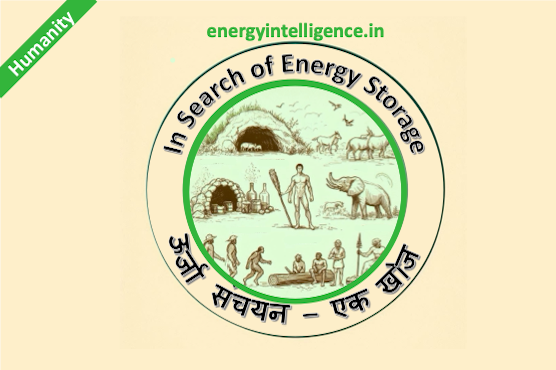
Energy Storage and Early Humanity (ऊर्जा संचयन और प्रारंभिक मानवता)
Share
The ability to store and manage energy has been a crucial factor in the development of human civilization, setting our species apart from others and enabling our rapid progress. This section explores how early humans leveraged various forms of energy storage, from food preservation to the control of fire, and how these innovations shaped our cognitive and social evolution.
Food Storage: Fueling Brain Development
One of the earliest and most significant forms of energy storage developed by humans was food preservation. Unlike many animals that rely on immediate consumption, early humans developed sophisticated methods to stockpile food resources, allowing them to overcome the feast-or-famine cycle that constrained other species.
Preservation Techniques:
Early humans employed various techniques to preserve food:
- Drying and smoking meat
- Gathering and storing seeds and nuts
- Drying fruits
These methods enabled our ancestors to maintain a more consistent caloric intake throughout the year, providing a stable energy supply crucial for survival and development.
Impact on Brain Evolution:
The ability to store high-energy foods, particularly protein-rich meats, had profound implications for human brain development:
- The human brain consumes approximately 20% of the body's energy, despite making up only about 2% of body weight
- Stable access to nutrient-dense foods provided the foundation for the expansion of brain size and cognitive capabilities over millions of years
- This created a positive feedback loop: better nutrition led to increased cognitive abilities, which in turn allowed for more sophisticated food gathering and storage techniques
Fire: A Revolutionary Form of Energy Storage
The control of fire, estimated to have occurred around 1 million years ago, was a pivotal moment in human evolution. Fire provided multiple benefits:
- Warmth and protection from predators
- Ability to cook food, making it easier to digest and extract nutrients
- Light, extending productive hours beyond daylight
Firewood as Fuel
The practice of gathering and storing firewood as fuel was an early form of energy storage with far-reaching implications. It allowed humans to:
- Maintain a consistent source of heat and light
- Cook food more efficiently
- Expand into colder climates and survive harsh winters
Environmental Energy Storage
Early humans began to recognize and utilize locations that provided natural shelter and retained heat, such as caves. This understanding of environmental energy storage, combined with the ability to create and maintain fire, allowed our ancestors to:
- Expand into diverse climates
- Survive in harsh environments
- Establish more permanent settlements
Fermentation: A Breakthrough in Food Preservation
Fermentation represents another significant advancement in early human energy storage techniques. This process not only preserved food but also enhanced its nutritional value and created new, energy-rich products.
Key points in the history of fermentation:
- The earliest evidence of fermented substances dates back to around 3,700 years ago, with mead being described in the Rigveda
- Dairy fermentation began around 10,000 BCE, utilizing milk from domesticated animals
- Evidence of fermented alcoholic beverages made from fruit, honey, and rice has been found in Neolithic China, dating back to 7000-6600 BCE
- The earliest archaeological evidence for beer brewing from cereals dates back approximately 13,000 years
Fermentation played a crucial role in many ancient civilizations, including Egypt, Babylonia, and China. It allowed for the preservation of food surpluses, the creation of new food products, and the development of early forms of medicine.
The Cognitive Leap
The development of these energy storage techniques required and fostered cognitive advancements:
- Planning and foresight to gather and store resources for future use
- Problem-solving skills to develop preservation techniques
- Social cooperation to manage shared resources
These cognitive developments set humans apart from other species and laid the groundwork for more complex social structures and technological innovations.
Setting the Stage for Civilization
The early forms of energy management and storage developed by our ancestors were foundational to the complex energy systems that would later drive human civilization and technological advancement. They enabled:
- More stable and larger populations
- The development of agriculture and animal domestication
- The emergence of specialized roles within societies
- The beginnings of trade and economic systems
As humans refined their ability to preserve food, control fire, and utilize environmental energy storage, they created a foundation for more stable and larger populations. This stability allowed for the gradual development of agriculture and animal domestication, which in turn provided more reliable and abundant food sources. The increased food security and energy availability enabled communities to grow beyond the constraints of hunter-gatherer societies, setting the stage for the emergence of early civilizations.
As populations became more settled and food production more efficient, a surplus of energy and resources emerged. This surplus allowed for the development of specialized roles within societies, moving beyond mere subsistence to include artisans, traders, and eventually, more complex societal structures. The ability to store and manage energy resources also facilitated the beginnings of trade and economic systems, as communities could now produce excess goods for exchange.
This economic activity, fueled by improved energy management, further accelerated technological advancements and societal complexity, creating a positive feedback loop that would ultimately lead to the rise of early civilizations and set humanity on the path to the energy-intensive societies we know today. The mastery of energy storage, from simple food preservation to complex fermentation processes, has been a defining feature of human progress, shaping our cognitive abilities, social structures, and technological capabilities throughout history.
Note: At Energy Intelligence we look at the long arc of energy storage to develop our solutions and strategies.
